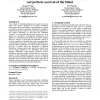Free Online Productivity Tools
i2Speak
i2Symbol
i2OCR
iTex2Img
iWeb2Print
iWeb2Shot
i2Type
iPdf2Split
iPdf2Merge
i2Bopomofo
i2Arabic
i2Style
i2Image
i2PDF
iLatex2Rtf
Sci2ools
108
click to vote
GECCO
2007
Springer
2007
Springer
Distribution replacement: how survival of the worst can out perform survival of the fittest
A new family of "Distribution Replacement” operators for use in steady state genetic algorithms is presented. Distribution replacement enforces the members of the population to conform to an arbitrary statistical distribution, defined by its Cumulative Distribution Frequency, relative to the current best individual. As new superior individuals are discovered, the distribution “stretches” to accommodate the increased diversity, the exact opposite of convergence. Decoupling the maintenance of an optimal set of parents from the production of superior children allows the search to be freed from the traditional overhead of evolving a population of maximal fitness and, more significantly, avoids premature convergence. The population distribution has a significant effect on performance for a given problem, and in turn, the type of problem affects the performance of different distributions. Keeping mainly good individuals naturally does well on simple problems (as do distributions ...
| Added | 07 Jun 2010 |
| Updated | 07 Jun 2010 |
| Type | Conference |
| Year | 2007 |
| Where | GECCO |
| Authors | Howard Tripp, Phil Palmer |
Comments (0)

